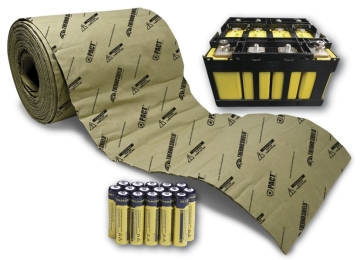Extinguishing the Threat of Dangerous Battery Fires
- Published: May 10, 2023
As the number of battery technologies continue to increase to charge up the modern world’s multitude of electronic devices, so too has the threat of lethal battery fires. Connecticut’s Packaging and Crating Technologies (PACT®) has developed a patented, fire-suppressant packaging wrap called PACT® Thermo ShieldTM, designed to control lithium battery thermal runaway, which causes dangerous and oftentimes deadly fires. It has passed the proposed testing standards of the SAE International for safety in shipping lithium-ion batteries via land, sea and air.
“Lithium-ion batteries are in most every electronic device you own whether it be for work or play and can become hazardous if they’ve been damaged or have some kind of defect, ultimately causing devastating, explosive fires,” said Rodger Mort, President of PACT®, LLC. “Our proprietary PACT® Thermo ShieldTM product line is a protective and affordable solution that is quickly becoming an industry must when travelling, shipping, storing or disposing of products containing lithium-ion batteries.”
Specifically, PACT® Thermo ShieldTM is a lightweight, pleated, paper material with a non-toxic, moisture vapor application that prevents thermal runaway, a phenomenon in which the lithium-ion cell enters an uncontrollable, self-heating state caused by extremely high temperatures, shaking or puncturing during transit.

Thermal runaway can result in the ejection of toxic gas, shrapnel and/or particulates, as well as smoke and fire. If this occurs, the protective PACT® Thermo ShieldTM wrap immediately cools the internal environment of the package, while limiting oxygen around the payload. This process prevents the thermal runaway from spreading to other areas of the package, thus, suppressing a potential fire and shielding the surrounding environment from damage.
In the event of a fire, Mort notes that PACT® Thermo Shield TM is capable of containing temperatures up to 800 degrees Celsius or nearly 1,500 degrees Fahrenheit, while restricting the temperature outside of the wrap to 60 degrees Celsius/140 degrees Fahrenheit. “Lithium-ion battery fires are very difficult to extinguish and usually have to smolder out on their own after many hours, emitting lethal fumes and gases,” he adds. “This makes our product’s ability to contain both the fire and residual smoke within the protective wrap even more crucial.”
Mort further elaborates that besides hand-held devices, like cell phones, Bluetooth headsets and headphones, computer accessories, digital cameras, e-readers, game controllers, laptops, tablets, smartwatches and smoke/fire/carbon monoxide detectors, the most recent and prevalent items containing lithium-ion batteries that have become fire hazards are electric bikes, scooters, hoverboards, unicycles and electric cars.
“Leaving any lithium-ion battery to charge unattended is a major safety hazard, but can become a crime scene especially in large, populated cities like New York and Chicago where entire blocks have burnt down and many human lives have been lost, often firefighters, police officers, EMS technicians and other first responders,” said Mort.
To address this escalating issue, PACT® designed a special product for E-mobility batteries – the PACT® Thermo Shield TR SleeveTM, in which its specially-coated, fire-suppressant paper is wrapped around each battery cell to mitigate thermal runaway between them, thus serving as a heat and flame barrier. Two independent third-party organizations tested TR Sleeve multiple times and concluded that TR sleeve prevented thermal runaway propagation amongst cells.
Besides transporting and storing items that contain lithium-ion batteries, Mort notes that PACT® Thermo Shield TM also provides an eco-friendly way to ship or transport products safely to a battery recycler. The company recently unveiled a smaller product, the TR Envelope to safely transport and store recyclable smaller devices such as cell phones, pagers, smartwatches and A-D batteries.
“Consumers need to do their part to prevent lithium-ion battery fires by properly recycling their unused electronics and mobility devices,” concludes Mort. “They cannot be tossed in the trash or a regular recycling bin but must be separated from combustible materials like cardboard, paper, and wood scraps.”
For more information, visit: https://www.pactthermoshield.com/.








